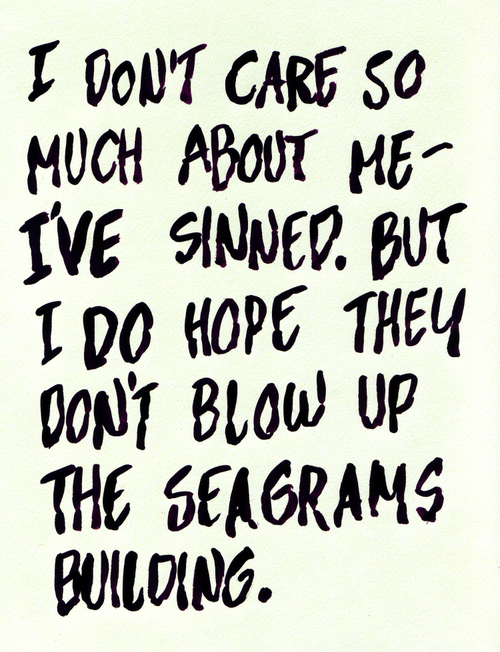
Timothy Buckwalter [title not given] 2006 acrylic ink on paper 8.5" x 11"
The destruction and invasion of Lebanon is very likely to spell disaster for New York, and for any other people or place rightly or wrongly perceived to be the agent of this "war".
While it is only the latest consequence of incompetent statecraft in which these two have been joined, the rapidly disintegrating and certainly doomed U.S.-Israeli adventure in the Middle East is clearly the most dangerous in the entire history of their relationship.
Not surprisingly, Washington has already lost support the support of its allies, nations which were once vested unequivically both morally and materially in the defense of the Israeli state. Elsewhere even governments in islamic nations which in the past have been inclined to sit more or less quietly on the sidelines during conflicts in which either the U.S. or Israel has been involved now fear for their own survival. The increasing frustration and anger of their own populations threatens regimes in a virtually continous line stretching across Africa and Asia from the Atlantic to the Pacific Oceans.
Many people who have not accepted our arrogant imperium naturally see opposition to American involvement in their own lands as a necessary crusade for self-respect, if not for cultural, even physical survival. Governments which are unable to adapt to this movement will fall, to be succeeded by regimes our own is unlikely to find quite so manageable.
The most angry members of the opposition are not likely to wait at home.
This morning on the Brian Lehrer Show [although he annoys me so much I can't usually listen, even lying in bed waiting to wake up] I was impressed by what his guest, Colonel Sam Gardiner had to say about events in Lebanon. Gardiner, who has taught strategy and military operations at the National War College, predicted that if the fighting were allowed to continue it would mean that governments would fall and the new ones were likely to produce a much larger conflagration. In a brief reference to a war from another world altogether and one which wouldn't normally come to mind in this context, he described a multi-nation [multi-people, multi-agency?] conflict initiated, not as in World War I where it began with the rulers at the top, but from the bottom up.
Although not all of us will admit it yet, the U.S. is also burdened with a government operating independently of its people. None of us has any real impact on its composition or its policies, but no one expects a revolution here, while Americans lie asleep in front of their TV sets. Those who actually do see and care about what's happening can only "hope" for the best - for the Seagram Building of course, and for lots of other folks and stuff too.
[image, via a tip from Barry, from Timothy Buckwalter]